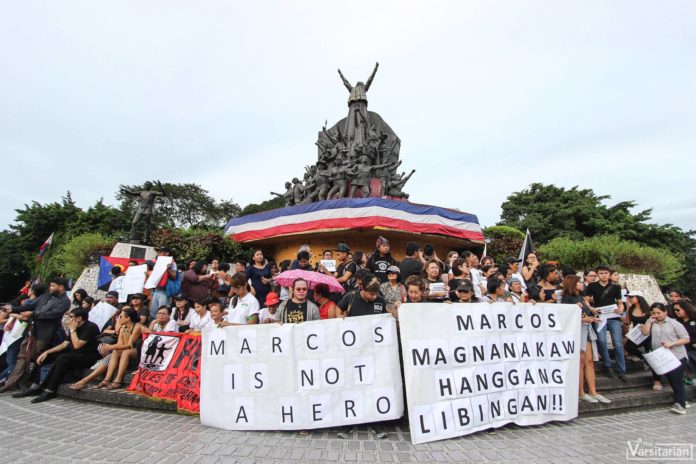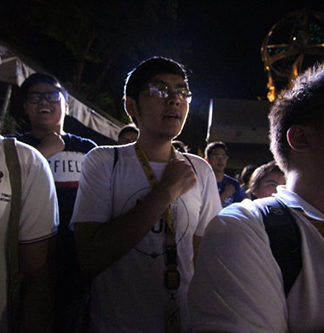
ALUMNI have criticized the UST administration and campus community for not showing up during the 31st anniversary celebration of the Edsa People Power Revolt last Feb. 25 and their alleged silence over such issues as the thousands of drug-related killings under the new administration of President Duterte, the burial of Ferdinand Marcos at the Libingan ng mga Bayani, the revival of capital punishment, and even the return of mandatory Reserved Officers Training Corps (ROTC), whose abolition UST had played an active part in 15 years ago.
They pointed out that the lack of UST participation in the Edsa celebration and other assemblies raising concern that the country might be sliding back to dictatorship contrasted sharply with the active roles played by other major universities opposing the tendency.
“Hearing nothing from my beloved University amid a cacophony of public statements and opinions about a very important event is really disappointing,” said Philippine Star senior deskman Melchor Elona.
But Sister Regina Kuizon, RGS, co-chair of the Association of Major Religious Superiors in the Philippines (AMRSP), said she knew of several alumni who participated in the Edsa anniversary rites and other protest rallies.
“UST was not at all silent since some Thomasian alumni’s voices simply blend with the rest of the Filipino people,” explained Kuizon.
A member of Batch 1986 of AB Journalism of the Faculty of Arts and Letters, Elona expressed disappointment that UST had not released a single statement or joined assemblies to commemorate the popular revolt that ousted Marcos.
“It’s never been the habit of the University to issue public statements on political issues, but there are moments when it really has to take a stand and make that stand known to all and sundry,” Elona told the Varsitarian in an e-mail. “I don’t expect UST to issue statements on every issue, but Feb. 25, 2017 was no time for silence.”
“I don’t know why they chose silence,” he added. It’s unfair to speculate. A university that has survived for centuries and nurtured great men and women surely has the power to influence public opinion if it wants to.”
‘Silence of universities’
Alumni pointed to the remarks of former Senate President Edgardo Angara made during the inauguration of the Academia Filipina last Feb. 24, in which he complained about the silence of “institutions … (such as) universities” over Duterte’s alleged iron-booted rule.
“Some 31 years after People Power overthrew the dictatorship, our liberties are in jeopardy once again,” said Angara. “The institutions that serve as its bulwark, such as the media and universities, are suddenly quiet. Men and women of intelligence and passion for country stand silent and remain passive.”
UST alumnus and National Artist for Literature F. Sionil José, told the Varsitarian he and Angara co-founded the Academia Filipina to gather “our National Artists and National Scientists, plus some young and old Filipinos who have distinguished themselves in their particular professions.”
“The major purpose of the Academia Filipina is to promote and protect Filipino culture as the bedrock of the Filipino nation,” he added.
Angara said there was widespread populism and demagoguery and warned against a slide to fascism and totalitarianism.
He said Philippine democracy was failing because of political turncoatism and the “lack of a true party system,” and a “largely disconnected—if not entirely indifferent—elite.”
“That’s the reason why we need Academia Filipina—to put our minds and expertise together toward finding our own solutions to the country’s biggest challenges and arresting the decline of democracy and freedom,” Angara declared. “Toward supporting and strengthening key institutions—media, civic organizations, the courts and universities. And toward fostering an intellectual climate conducive to reform and change.”
Former AB Student Council president Marie Jann Klaire Lazo said UST’s alleged silence on key public issues was a betrayal of its own “vision-mission.”
“[The UST administration] should revisit the institution’s mission and vision – that the University is committed to the service of the Church, nation and global community, and envisions itself to produce morally formed professionals for social transformation,” said Lazo, who now teaches at the St. Joseph’s College in Quezon City.
She said the UST administration should take a more active stance toward social issues so as to encourage the Thomasians to effect social change.
“But with the absence of leadership from the administrators, how can we then challenge our students to go out and contribute to social change? How can we apply being Christian and Catholic if in those issues and with the issues at hand, we fail to become a man for others?” Lazo asked.
An AB Journalism alumna and a former media professional herself, Sister Kuizon, who’s provincial of the Religious of the Good Shepherd, said UST was heard and its voice blended with the rest of the people in response to the call to be “brave and vigilant” in fighting for human rights.
She noted the heavy UST participation in the Walk for Life prayer rally at the Luneta Park last Feb. 18.
The Institute of Religion in fact helped in the liturgical needs of the rally and mobilized participation of the campus community in the Walk for Life that was organized by the Council of the Laity of the Philippines and supported by the AMRSP and Catholic Bishops of the Philippines (CBCP) headed by Lingayen-Dagupan Archbishop Socrates Villegas, a member of the Dominican Clerical Fraternity.
“There might not be a dominant voice from the University but there were many [UST alumni at the celebration of Edsa 31] who believe in the spirit of Edsa and hope that peace and justice will reign in our country,” Kuizon, a former Special Reports editor and later assistant adviser of the Varsitarian.
UST firm vs death penalty
Fr. Rector Herminio Dagohoy, O.P. said he was not able to join the Feb. 25 protest due to his hectic schedule.
“Why not?” he said about UST participating in the celebration. “That is an important event in the country and it is important that we don’t forget the meaning of Edsa.”
Dagohoy denied UST had been silent on important issues, citing the University’s stand against extrajudicial killings and the death penalty.
He said UST was firm in its support for the stand of the CBCP on the right to life.
“We made our stand clear with all of those [issues]. We are with the Church in regard these issues,” said Dagohoy.
“I think the government really has to explore other possible ways, because the Church looks at death penalty only as an ultimate and last resort when all other options have failed,” he said.
Dagohoy also called for reforms in the judicial system.
“That’s actually the position of the Church, [that] we to have reform our penal [and] judicial system, police and all these things so that those who are indeed guilty would be punished and those who are not would be free.”
‘Choose life’
Kuizon emphasized the significance of the support of the Dominican priests and the Thomasian community in opposing the reinstatement of the death penalty.
“To speak the truth, to stand by it, to choose life—these are values that UST as a Pontifical University can proclaim,” Kuizon said.
After the House of Representatives passed the death-penalty bill last March 9, University posted on its Facebook account a pitch-dark image of the official UST seal with the inscription, “#NoToDeathPenalty.”
The University had been previously criticized on social media for not releasing any statement about the hero’s burial for Marcos.
Dagohoy had said there was no need to make an official statement since campus students councils had already made their stand known, such as the ABSC and Central Student Council. But Elona said that the UST administration should have come up with a statement.
“They’re (by) student councils,” he said about the statements. “They represent student groups, not the University.”
Elona added UST had not even reacted to the executive order of Duterte restoring mandatory ROTC despite the killing in 2001 of UST cadet Mark Welson Chua by ROTC officers themselves many of whom remain at large.
The killing sparked student protests nationwide so that Fr. Tamerlane Lana, OP, UST rector at that time, led the University Belt Consortium in calling for the scrapping of mandatory ROTC.
In 2002, President Arroyo signed the law establishing the National Service Training Program that made ROTC optional. With reports from Christian De Lano M. Deiparine














